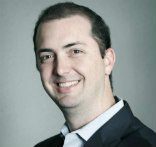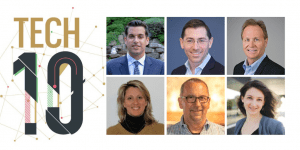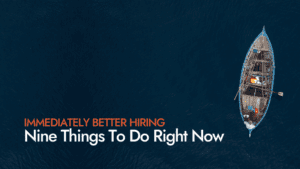From Turnaround CEO to Early Stage HealthTech Investor, A Fireside Chat with the Director of the INOVA Personalized Health Accelerator
Can a Successful Turnaround CEO help Turnaround the early stage HealthTech investment market?
That’s a question that was partially answered on Monday when Startup Grind Columbia hosted Mike Thomas, Director of the INOVA Personalized Health Accelerator. Chris Haug, Startup Grind chapter Director, lead an intimate fireside chat with Mike for an audience of local entrepreneurs. INOVA is rapidly becoming an important part of the regional biohealth-tech ecosystem with an increased focus on engaging the business and entrepreneur communities, and the launch of their new investment fund. Startup Grind hosts monthly events for entrepreneurs with the mission is to educate, inspire and connect. From start to finish they accomplished all three, so we want to share Mike’s story for those who couldn’t attend.
Mike, a Maryland native out of Anne Arundel County, got his degree in Microbiology from Cornel but has been drawn to business since before even graduating. He first began his entrepreneurial journey in college when he started a window washing and general home services company with his now wife to serve customers in the Annapolis area. Like everything that Mike would eventually touch, it quickly became a successful business. However, upon graduation and with some parental pressure he decided to put his degree to use so he took a pay cut and joined Merck as a pharmaceutical sales rep.
He worked his way up the ladder at Merck and then GSK by building a reputation for good business strategy, teamwork, and most importantly delivering great results. His first real entrepreneurship opportunity came in 1995 when he was approached to join a specialty disease management startup company to launch their products/services to pharmaceutical firms, managed care organizations, and government agencies. As the first head of sales, he recalled that it came with a very clear job description from the CEO. “If you close deals you’ll make the company, and if you don’t close deals the company goes under. It’s on your shoulders.” He took the challenge and closed enough deals to take the company public in two years, delivering an 80X return to their investors. Needless to say that he hit a grand slam by any investment criteria, but now he had the bug for startups.

From there Mike joined Bill Niland (most recently of Harpoon Medical fame) at his former company, National Sleep Technologies, where he helped to build the first national sleep lab services company, lead their sales, M&A, fundraising and eventual exit to GE Capital. With two successful exits under his belt, and clearly displaying a desire for a good challenge, he joined Sleep Solutions, a venture-backed company out of Palo Alto, CA. He was their 5th CEO and realized quickly that the company was in bad shape. After reporting the desperate state of things to the Board he was advised to fold the company, but he believed he could find a way to turn it around. This would become one of Mike’s greatest challenges that would make his career and build his reputation as the ‘turn-around guy’. When he joined the company it had $5M in the bank and was burning $1M per month, so he immediately had to make some hard decisions and layoff 90% of their employees. That started an 8-year grind of bootstrapping the company back to success. With a team of just four employees, he hit reset, moved the company to Maryland, restructured around a new business model, gritted through 200,000 miles in the air for five consecutive years with no vacation, and defied all odds to turn things around. He secured $50M in growth funding, redefined this market and rebuilt the company to 140 employees before he left. The company was sold and became Novasep. After accomplishing what many thought was going to be impossible, Mike could finally take a break.
The next few years for Mike were more much less stressful as he spent time in a consulting role. Before too long he was recruited to another turn-around CEO role for an Australia company, where after two years he had navigated another successful outcome. After turning the company over he came back in the States where he took on a few more startups and some part-time CEO roles over the coming few years. Then in 2017 INOVA came knocking to run their brand new investment fund.
So what made Mike “join the dark side”, as his friends called it, and transition from an entrepreneur to an investor? Well, it didn’t happen overnight. Initially, he wasn’t interested because he had more of an ‘old school’ mindset and didn’t like accelerators, which he thought were great for millennials but not for real growth companies. However, it was INOVA’s vision to build an old-fashioned, strategic investment, seed based fund, and the leadership who are some of the smartest people he’d ever worked with that really got him excited. As he evaluated the opportunity he looked at his past and realized that of the $150M that he had raised in his career, it was all from outside the region. This seemed ridiculous to him, especially for the healthcare market in this region. “This would be the chance to change the ecosystem in the region.” he reflected. “This should be the epicenter for healthcare startups and investment, especially with NIH, CMS, FDA and the truly incredible talent in the region; from the universities and deep pool of entrepreneurs.” With a new challenge in front of him, Mike became the INOVA Personalized Health Accelerator Director in July 2017.

The INOVA Personalized Health Accelerator isn’t really an accelerator by the traditional sense. It’s an investment fund for early-stage startups, one of the only in the region, that aims to accelerate its investments by strategically leveraging INOVA’s assets in the deal. The fund is expected to accept no more than 9 to 10 companies who must have a prototype and be at the validation or proof of concept phase. It’s a double strategy fund that aims to have a strategic investment return as well as a strategic impact on INOVA assets. Kinometrix, whose founder was also at the event, is a great example of that. Their AI platform is developed for tracking and measuring physical therapy progress which can build efficiencies in patient care and save millions for health systems. Other investments they have made include CoverMy Test whose software speeds insurance verification for genomic testing and Hememics which develops rapid diagnostic test platforms to detect various bacterial and viral pathogens.
For Mike and his team at INOVA PHA, this is the chance to reshape the early stage investment landscape locally and nationally. They have identified very few local funds serving the early stage deal market in the BioHealth Capital Region, and that’s a big problem, or more-so an opportunity as INOVA sees it. He pointed out that even with the volume of R&D happening at local universities the funds at many universities are aimed at later stage deals. Universities often promote non-dilutive funding but as Mike sees it; “Often, companies that are good at non-dilutive funding are good at writing grants, but not good at commercializing a product.”
A recent report that their team developed showed that most HealthTech funds are targeting later stage deals, putting a squeeze on early-stage funding. Mike and his team see this as a great opportunity for their investment model, and outlined some additional market conditions that help support that theory, such as the policy strategy of the current FDA and what he defined as the “Rx to OTC switch”. This is a trend in which consumers are becoming savvier and thus empowered to be more responsible for their healthcare decisions, instead of relying on a more prescription heavy approach. Mike and his team are on calls each month with other health system investment funds across the country and see that they have the opportunity to be a leader in changing the early stage funding landscape.
In close, Mike had four pieces of advice that he’s learned over his successful career.
- Timing is important, especially in Healthcare. You can be too innovative and too far ahead of the curve.
- A ‘No’ today from an investor doesn’t mean ‘No’ tomorrow.
- You will get all sorts of advice from your board(s) or investors, but you need to know when to follow your gut. That sometimes means going against that advice.
- Every entrepreneur needs a support system, especially a supportive spouse and/or family.
So after learning Mike’s story and seeing the track record of success that his career is built on, it’s a good bet that the success of INOVA’s PHA will be no different under his leadership. Like the popular Farmers Insurance tagline, He knows a thing or two, because he’s seen a thing or two.
If you’d like more information on the INOVA PHA visit https://www.inovapha.org/ and follow them on twitter at @INOVAPHA or @MikeThomasCEO
For more on Startup Grind Columbia and their upcoming events visit https://www.startupgrind.com/columbia-md/
For a list of other HealthTech companies in the BioHealth Capital Region check out the “HealthTech” category on our Regional BioMap.
Author: Chris Frew
- About the Author
- Latest Posts
Over the past 11 years, Chris has grown BioBuzz into a respected brand that is recognized for its community building, networking events and news stories about the local biotech industry. In addition, he runs a Recruiting and Marketing Agency that helps companies attract top talent through a blended model that combines employer branding and marketing services together with a high powered recruiting solution.






